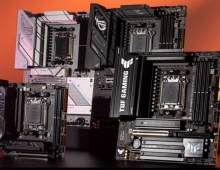
Intel's Unveils Core i5 and Core i5 Branding, Phase Out Centrino
Intel announced palns to repackage its Core family of microprocessors with new naming schemes - the Core i3, Core i5 and Core i7 - and plans to phase out some of its brands, including the "Centrino" for PCs.
Intel said that it planned to focus their strategy around Intel Core. Today the Intel Core brand has a mind boggling array of derivatives (such as Core 2 Duo and Core 2 Quad, etc). Over time those will go away and in its place will be a simplified family of Core processors spanning multiple levels: Intel Core i3 processor, Intel Core i5 processor, and Intel Core i7 processors. Core i3 and Core i5 are new modifiers and join the previously announced Intel Core i7. It is important to note that these are not brands but modifiers to the Intel Core brand that signal different features and benefits. For example, upcoming processors such as Lynnfield (desktop) will carry the Intel Core brand, but will be available as either Intel Core i5 or Intel Core i7 depending upon the feature set and capability. Clarksfield (mobile) will have the Intel Core i7 name.

So the key here is there will be a range of features and capabilities within the Intel Core family - Intel's flagship brand representing the highest performance and the latest technology - but simplified into entry-level (Intel Core i3), mid-level (Intel Core i5), and high-level (Intel Core i7). Intel will still have Celeron for entry-level computing at affordable price points, Pentium for basic computing, and of course the Intel Atom processor for all these new devices ranging from netbooks to smartphones. For PC purchasing, think in terms of good-better-best with Celeron being good, Pentium better, and the Intel Core family representing the best we have to offer.
Finally Intel is changing and transitioning some of the platform brands. Intel vPro technology continues to stand for high security and manageability and will henceforth be paired with Intel Core in either Core i5 or Core i7 iterations. Again this won't happen overnight, but beginning next year Intel business client systems will carry either the Intel Core i7 vPro processor or the Intel Core i5 vPro processor name. With this focus on Intel Core, the Centrino processor technology brand will be retired for PCs beginning next year. However, Centrino has tremendous equity as a wireless technology, so Intel transition the name to their Wi-Fi and WiMAX products beginning in 2010.
"This will be an evolutionary process taking place over time, and we acknowledge that multiple brands will be in the market next year inclduing older ones, as we make the transition," Intel spokesman Bill Calder wrote on a company blog. "But overall this is a good thing, designed to make it easier and more rational over the long run," he added.

So the key here is there will be a range of features and capabilities within the Intel Core family - Intel's flagship brand representing the highest performance and the latest technology - but simplified into entry-level (Intel Core i3), mid-level (Intel Core i5), and high-level (Intel Core i7). Intel will still have Celeron for entry-level computing at affordable price points, Pentium for basic computing, and of course the Intel Atom processor for all these new devices ranging from netbooks to smartphones. For PC purchasing, think in terms of good-better-best with Celeron being good, Pentium better, and the Intel Core family representing the best we have to offer.
Finally Intel is changing and transitioning some of the platform brands. Intel vPro technology continues to stand for high security and manageability and will henceforth be paired with Intel Core in either Core i5 or Core i7 iterations. Again this won't happen overnight, but beginning next year Intel business client systems will carry either the Intel Core i7 vPro processor or the Intel Core i5 vPro processor name. With this focus on Intel Core, the Centrino processor technology brand will be retired for PCs beginning next year. However, Centrino has tremendous equity as a wireless technology, so Intel transition the name to their Wi-Fi and WiMAX products beginning in 2010.
"This will be an evolutionary process taking place over time, and we acknowledge that multiple brands will be in the market next year inclduing older ones, as we make the transition," Intel spokesman Bill Calder wrote on a company blog. "But overall this is a good thing, designed to make it easier and more rational over the long run," he added.





















